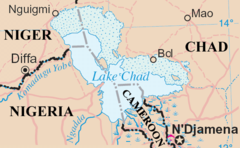The Lake Chad Basin faces a critical moment. Spanning Chad, Cameroon, Nigeria, and Niger, this region provides for nearly 30 million people who depend on its shared natural resources, particularly land, water, and fisheries, for survival and livelihoods. But Lake Chad, once a vast and productive water resource, has shrunk by more than 90 per cent over the past fifty years, largely due to climate change and mounting human pressures. This environmental crisis has intensified competition for resources, sparking conflicts among farmers, herders, and fishers. Recently, at the International Forum on the Development of the Lake Chad Basin held in N’Djamena, Chad, I joined experts to discuss solutions. As a panelist on the workshop for Inclusive Management of Natural Resource Conflicts, I emphasised how a shift toward inclusive, community-led resource management could lay the groundwork for a more secure, economically stable region.
The forum’s theme—“Enhancing Local Governance and Social Cohesion for Socioeconomic Development and Food Security in a Changing Climate”—pointed to the urgent need for governance reforms that directly involve local communities. For too long, top-down, centralised resource management has prevailed across the Basin, creating gaps between policy and local realities. This approach has often exacerbated inequality, weakened social cohesion, and contributed to inefficient use of resources. An inclusive management approach offers a pathway to reverse this trend by engaging local stakeholders in decision-making, fostering cooperation, and encouraging sustainable practices. Inclusive management not only offers social benefits but is also a strategic economic solution that can help avert the significant costs of conflict and instability.
Economically, the case for inclusive management is straightforward. Natural resources in the Lake Chad Basin are more than commodities—they are the foundation of local economies. When access to these resources is inequitable, the impacts are severe: weakened economies, increased poverty, and heightened social tensions. On the other hand, including local actors in resource governance helps to mitigate these risks. Cooperation increases, and resources are managed more sustainably and equitably. This reduces the costly economic losses associated with conflict, which the World Bank estimates to be as high as 15-20 per cent of GDP in regions affected by prolonged instability. If inclusive management can prevent resource-based conflicts, the economic and social benefits for the region could be transformational.
An essential concept I highlighted at the forum was positive deviance—the idea that communities who innovate successful solutions within challenging conditions can provide valuable models for others. Within the Lake Chad Basin, some communities have managed resource conflicts through local agreements that allow farmers, herders, and fishers shared, equitable access to the land and water they need. These communities offer powerful examples of how to effectively manage natural resources under shared pressure. By identifying and scaling these instances of positive deviance, the Basin can find solutions to its challenges that are grounded in local realities.
Yet to realise these benefits, the region must avoid isomorphic mimicry—the tendency to copy policies that work elsewhere without considering the local context. Imported water management models and centralised bureaucratic approaches rarely suit the Basin’s specific social and environmental dynamics. Traditional systems of communal land and water use have helped sustain local communities for centuries. Therefore, any effective governance framework must respect these indigenous practices and draw on local expertise rather than imposing foreign templates that may not address root issues.
The costs of inaction are high. Conflict disrupts local markets, reduces agricultural production, and drives poverty and migration, all of which compound regional instability. Without inclusive governance, the Basin risks a cycle of worsening resource scarcity, intensified competition, and further economic decline. However, the Lake Chad Basin Commission, through fostering cross-border cooperation and promoting fair resource-sharing mechanisms, has the potential to be a key facilitator of change. By creating a framework that respects local knowledge and promotes collaborative governance, the Commission can support economic resilience, food security, and regional peace.
The future of the Lake Chad Basin lies in replacing competitive, exclusionary resource management with cooperative, community-driven approaches. This shift calls for a rethinking of governance: from seeing resources as assets to be divided to viewing them as shared goods requiring collective stewardship. Only by adopting inclusive governance can the region leverage its local expertise and community resilience to sustainably manage resources in ways that support social harmony and economic prosperity.
Ultimately, the Basin’s future hinges on its ability to embrace inclusive management and local empowerment. This approach is about far more than resolving immediate resource disputes—it is about laying a foundation for sustainable development in the face of climate change and shifting demographics. By entrusting communities with a voice in managing their resources, the Basin can build a future where shared waters truly mean shared responsibility, and shared responsibility leads to a peaceful and sustainable future for all.





